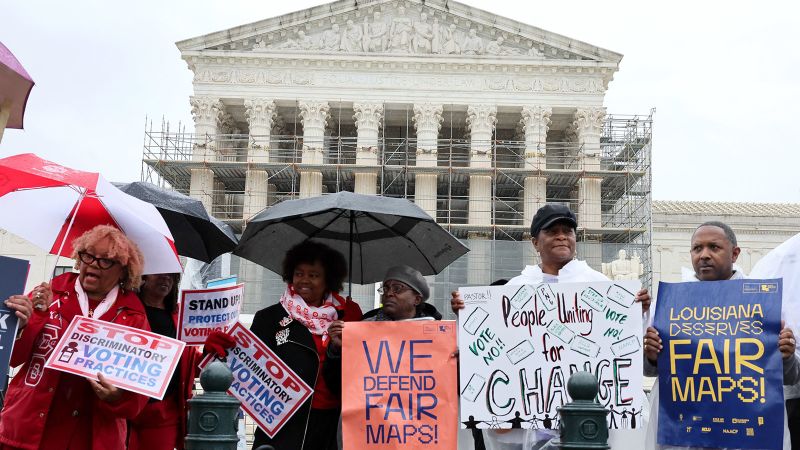
Supreme Court tees up Louisiana redistricting case that could undercut Voting Rights Act
How did your country report this? Share your view in the comments.
Diverging Reports Breakdown
Supreme Court tees up Louisiana redistricting case that could undercut Voting Rights Act
The Supreme Court signaled Friday that it will take a broader look at a redistricting fight. The high court reframed what is at stake in the Louisiana appeal and said it will probe whether a state runs afoul of the Constitution. If the court answers affirmatively, it would likely bar a state from adding an additional majority-minority district to ensure that minority voters have an equal opportunity to elect candidates of their choice. The Louisiana case is among the most important appeals the court will consider later this year. It could also set a standard for how much lawmakers in every state may consider race – if at all – when they redraw the lines every decade. The outcome of the case could have nationwide implications, including the shape of the districts – and therefore the electability – of several key GOP leaders in the House who represent Louisiana, including Speaker Mike Johnson, who represents the Louisiana House of Representatives.
The Supreme Court signaled Friday that it will take a broader look at a high-profile redistricting fight over Louisiana’s congressional map, subtly expanding the scope of an appeal that could weaken the landmark Voting Rights Act.
In a brief order, the high court reframed what is at stake in the Louisiana appeal and said it will probe whether a state runs afoul of the Constitution when it seeks to remedy a Voting Rights Act violation. If the court answers affirmatively, it would likely bar a state from adding an additional majority-minority district to ensure that minority voters have an equal opportunity to elect candidates of their choice.
Rick Hasen, an election law expert at the UCLA School of Law, described the move on his blog as “a big, and dangerous, step toward knocking down” a key pillar of the 1965 Voting Rights Act.
The Supreme Court essentially punted on Louisiana’s messy redistricting fight on the last day of its term in June, taking the rare step of holding the appeal for a new set of arguments. At the time, the court said it would provide clarity on exactly which question it wanted the parties in the case to address.
Court watchers have been waiting for that clarity for weeks. On Friday, the justices handed down a brief order asking the parties to submit a new round of briefing by early October, when the court’s new term will begin.
The parties involved in the case will now submit written arguments about whether “the state’s intentional creation of a second majority-minority congressional district violates the Fourteenth or Fifteenth Amendments to the U. S. Constitution.”
The Louisiana case is among the most important appeals the court will consider later this year.
Election experts said the court’s new framing questions whether states may fix Voting Rights Act violations without running up against the Constitution. Section 2 of the VRA requires consideration of voters’ race to ensure that congressional and state legislative voting districts are drawn fairly.
“The court is asking for briefing on whether the race-based redistricting sometimes required by Section 2 of the Voting Rights Act is no longer constitutional in Louisiana – and by implication, in states with similar circumstances” to those in Louisiana, said Richard Pildes, an election law expert at the New York University School of Law.
The outcome of the case could have nationwide implications. To begin with, it could affect the shape of the districts – and therefore the electability – of several key GOP leaders in the House who represent Louisiana, including Speaker Mike Johnson. It could also set a standard for how much lawmakers in every state may consider race – if at all – when they redraw the lines every decade.
The facts of the Louisiana case demonstrate the issue: At first, a federal court ruled the state likely violated the Voting Rights Act by drawing only one majority Black district out of six. When it tried to fix that problem by drawing a second majority-minority district, another court said it violated the Constitution by relying too much on race to meet the first court’s demands.
The Voting Rights Act requires that states not dilute the power of minority voters during the once-a-decade redistricting process, such as by “packing” those voters into one district or “cracking” neighborhoods up into many districts to spread out their influence. The law was enacted in response to decades of post-Civil War efforts – particularly in the South – to limit the political power of African Americans.
And yet the 14th Amendment’s equal protection clause demands that a state not draw a map predominantly based on race. If it does, the state must demonstrate that it had a compelling reason to do so and carried out the effort in the narrowest way possible.
Because of that inherent tension between the Voting Rights Act and the equal protection clause, the Supreme Court has tended to give states some “breathing room” in drawing their maps. One of the central questions in the case, Louisiana v. Callais, is exactly how much room state lawmakers should have.
Now, the court appears to be preparing to debate whether states should have any breathing room at all.
CNN Chief Supreme Court Analyst Joan Biskupic contributed to this report.
Source: https://www.cnn.com/2025/08/01/politics/supreme-court-louisiana-redistricting-case-voting-rights-act
